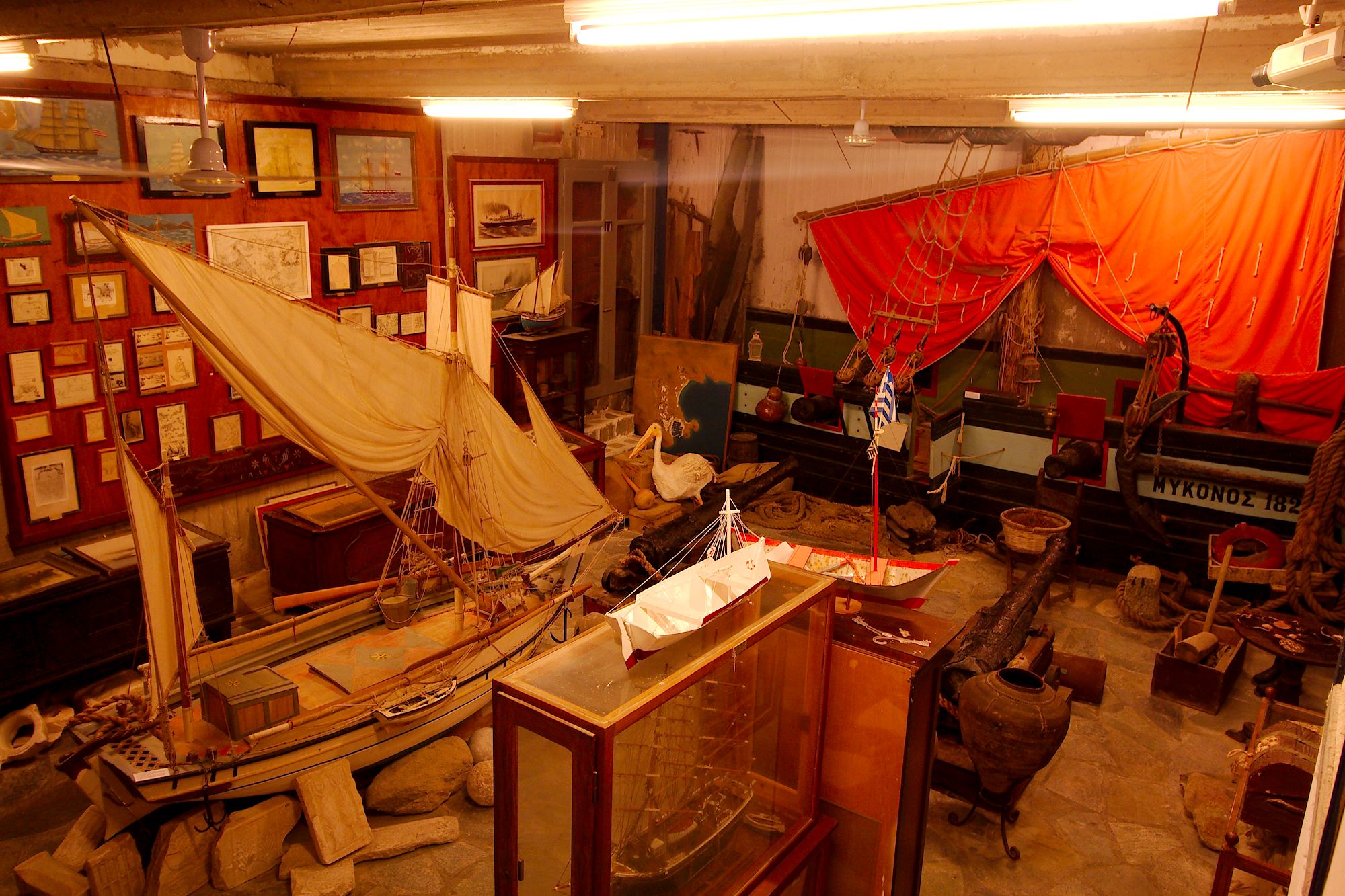Nestled in the heart of Mykonos Town, the Folklore Museum stands as a captivating testament to the island’s rich cultural tapestry. Housed in an exquisitely preserved 18th-century sea captain’s residence, this museum offers visitors a unique opportunity to step back in time and immerse themselves in the authentic island life of yesteryear. For those seeking to delve deeper into the soul of Mykonos beyond its famous beaches and vibrant nightlife, the Folklore Museum is an essential stop on any cultural itinerary.
The museum’s location in a traditional Mykonian sea captain’s house is significant in itself. These impressive dwellings, known as “kapetanospita,” were once the pride of the island’s maritime community. The building’s architecture reflects the prosperity and importance of sea trade to Mykonos’ history, with its sturdy stone walls, characteristic white-washed exterior, and strategic position offering views of the harbor. Our concierge service can arrange private guided tours of the museum, providing fascinating insights into the architectural features and historical context of this remarkable building.
As visitors cross the threshold of the Folklore Museum, they are immediately transported to a world that captures the essence of 19th-century Mykonian life. The ground floor of the museum is dedicated to recreating a typical island home of that era. Here, guests can explore meticulously arranged rooms that showcase the daily lives of Mykonian families. The main living area, or “sala,” features traditional furniture, textiles, and decorative items that paint a vivid picture of domestic life on the island. Intricate lace curtains, hand-woven rugs, and ornate mirrors reflect the artistic sensibilities and craftsmanship of the islanders.
One of the most fascinating aspects of the museum is its extensive collection of traditional Mykonian costumes. These garments, displayed with care and attention to detail, offer insight into the social customs and hierarchies of island society. Visitors can admire the intricate embroidery, vibrant colors, and unique designs that distinguished Mykonian dress. From everyday wear to elaborate wedding attire, each piece tells a story of the island’s sartorial heritage. Our concierge service can arrange for expert guides who can elucidate the symbolism and significance behind these beautiful garments, enhancing your understanding of Mykonian culture.
The museum’s collection extends beyond clothing to encompass a wide range of artifacts that illustrate various aspects of island life. Antique furniture, household utensils, agricultural tools, and navigational instruments offer a comprehensive view of how Mykonians lived, worked, and interacted with their environment. Of particular interest is the display of traditional musical instruments, providing insight into the island’s rich musical traditions that continue to this day.
One of the most poignant sections of the Folklore Museum is dedicated to the maritime history of Mykonos. Given the museum’s location in a sea captain’s house, this exhibition holds special significance. Visitors can explore nautical maps, ship models, and navigational tools that speak to the island’s seafaring legacy. Personal effects of Mykonian sailors, including letters, photographs, and logbooks, offer intimate glimpses into the lives of those who braved the Aegean Sea in pursuit of trade and adventure.
The Folklore Museum also houses an impressive collection of icons and religious artifacts, reflecting the deep spiritual traditions of the island. These beautifully preserved pieces, some dating back several centuries, showcase the skill of local artisans and the importance of Orthodox Christianity in shaping Mykonian culture. The intricate gold leaf work and delicate brushstrokes of these icons are truly awe-inspiring, even to those unfamiliar with their religious significance.
For history enthusiasts, the museum’s archive of historical documents is a treasure trove of information. Ancient manuscripts, legal documents, and personal correspondence offer fascinating insights into the social, economic, and political life of Mykonos through the ages. While these documents are primarily in Greek, our concierge service can arrange for expert translators to help you uncover the stories hidden within these yellowed pages.
The Folklore Museum extends beyond its interior, with a charming courtyard that provides a serene space for reflection. This outdoor area, typical of traditional Mykonian architecture, features potted plants, weather-worn stone benches, and sometimes hosts small exhibitions or cultural events. It’s an ideal spot to pause and absorb the wealth of information and impressions gathered from your visit.
As you conclude your journey through the Folklore Museum, you’ll find yourself with a deeper appreciation for the rich cultural heritage of Mykonos. This institution serves not only as a repository of artifacts but as a living testament to the enduring spirit of the Mykonian people. It offers a crucial counterpoint to the island’s more famous attractions, reminding visitors that beneath the glitz and glamour of modern Mykonos lies a profound and fascinating history.
For those wishing to delve even deeper into Mykonian culture, our concierge service can arrange specialized tours that combine a visit to the Folklore Museum with explorations of other historical sites on the island. These curated experiences allow you to trace the threads of Mykonian history from ancient times to the present day, providing a comprehensive understanding of this enchanting Aegean destination.
In conclusion, the Folklore Museum of Mykonos offers an unparalleled window into the island’s past, preserving and celebrating the traditions that have shaped its unique character. Whether you’re a history buff, a culture enthusiast, or simply curious about the authentic soul of Mykonos, this museum promises a rewarding and enlightening experience. As you wander through its carefully curated exhibits, you’ll gain a profound appreciation for the rich tapestry of island life that continues to influence Mykonos today.

